 Petzlover
Petzlover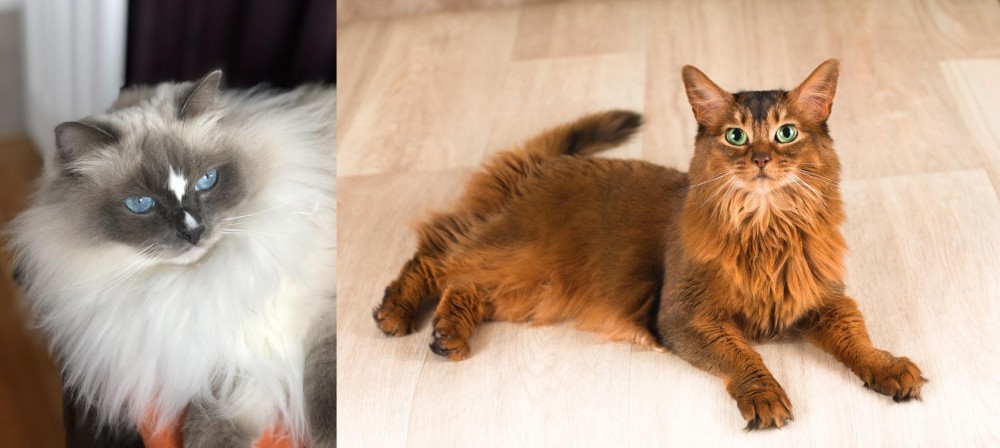 Both Ragdoll and Somali are originated from United States. Both Ragdoll and Somali are having almost same weight. Ragdoll may live 3 years more than Somali. Both Ragdoll and Somali has same litter size. Both Ragdoll and Somali requires Moderate Maintenance.
Both Ragdoll and Somali are originated from United States. Both Ragdoll and Somali are having almost same weight. Ragdoll may live 3 years more than Somali. Both Ragdoll and Somali has same litter size. Both Ragdoll and Somali requires Moderate Maintenance.
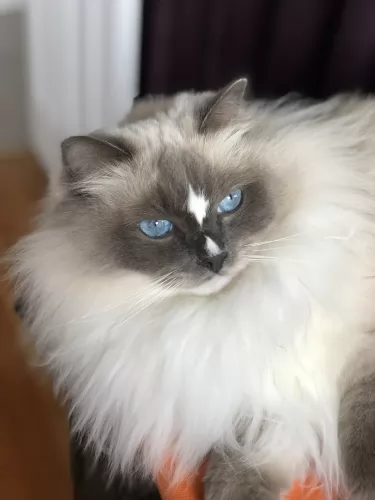 It was in the 1960s that a regular domestic longhaired cat with white fur produced several litters of cats. There was one litter where the kittens with a docile temperament, seemed to go limp when picked up.
It was in the 1960s that a regular domestic longhaired cat with white fur produced several litters of cats. There was one litter where the kittens with a docile temperament, seemed to go limp when picked up.
Anne Baker set out to start a breeding program and all Ragdolls are descended from Baker's cats. In fact, the cat credited as the original Ragdoll was a cat with the name Josephine, and Ragdolls are sometimes called ‘the daughters of Josephine.
Baker set up her own registry, the International Ragdoll Cat Association. The IRCA still exists, but another pair developed the Ragdoll standard that is accepted by major cat registries. Today. The biggest international Ragdoll breed club is the Ragdoll Fanciers' Club International.
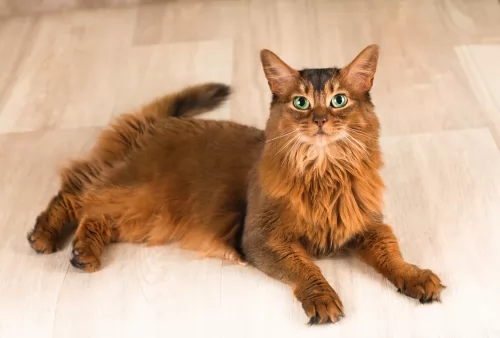 The Somali is a medium- to longhaired Abyssinian. It was in Britain that the original introduction of the longhaired gene took place.
The Somali is a medium- to longhaired Abyssinian. It was in Britain that the original introduction of the longhaired gene took place.
The first Somali cats came about in 1940 and it was British breeder Janet Robertson who exported some of her Abyssinian kittens to New Zealand, Australia and North America, Australia. Most of the kittens had long hair and breeders started showing an interest.
An American Abyssinian breeder Evelyn Mague decided to call her cats Somalis and the breed was recognized internationally by 1991.
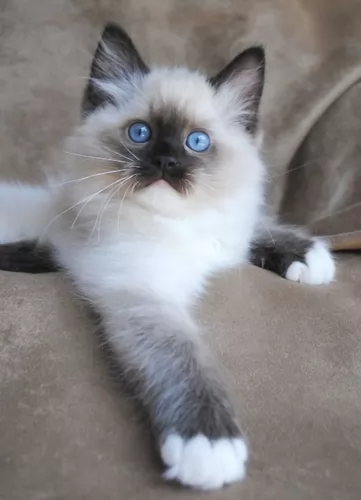 The beautiful Ragdoll cat is a large, heavy-boned cat. Sometimes they can be 9kg in weight. It has a soft, silky coat that can be semi-long to long.
The beautiful Ragdoll cat is a large, heavy-boned cat. Sometimes they can be 9kg in weight. It has a soft, silky coat that can be semi-long to long.
The cat has remarkable blue eye and the beautiful silky coat comes in several shades such as cream point, chocolate point, seal point, and others.
The ears are medium-sized and, the legs long and strong and the oval-shaped eyes are blue. The cat is known as a pointed breed, which means that the body is lighter in color than the points.
Ragdolls are casual, even-tempered, laid-back kind of cats. They are playful but not particularly energetic so you won’t find these cats leaping onto top perches such as what other cats do.
These docile cats love to be petted and pampered and carried around. It literally goes limp with pleasure at being loved and pampered by its human companions. He’s such a friendly cat who, much like a dog, will even greet you at the door and learn to play some games.
This amicable cat gets on well with children and other pets in the home, making a splendid family pet and he can even learn to walk on a leash.
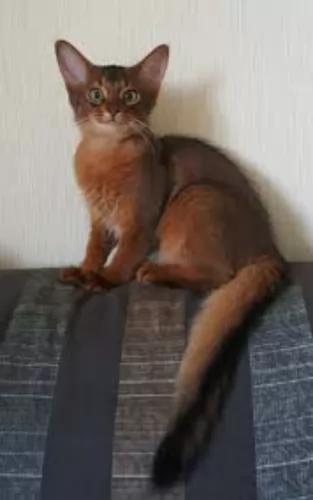 The beautiful Somali is a medium-sized cat which means he weighs in the region of 3 to 6kg. He is muscular and lean with the ears being set wide apart.
The beautiful Somali is a medium-sized cat which means he weighs in the region of 3 to 6kg. He is muscular and lean with the ears being set wide apart.
The ears are also tufted. The eyes of the Somali are almond-shaped and are usually a brown shade or green in color. The legs are long and the paws are also somewhat tufted. The tail is well plumed.
The Somali's coat is lovely and soft, while being thick and lustrous. The adult cats have a ruff. The Somali's coat comes in a range of colors but the most regular color is a beautiful brownish color with black ticking.
The Somali is an intelligent cat that relies heavily on its human owners for company as well as love and care.
They’re fun-loving cats that get on well with children in the home and from other pets. They are active cats and will need exercise. They should have some high perches and cat trees available so they can jump and climb.
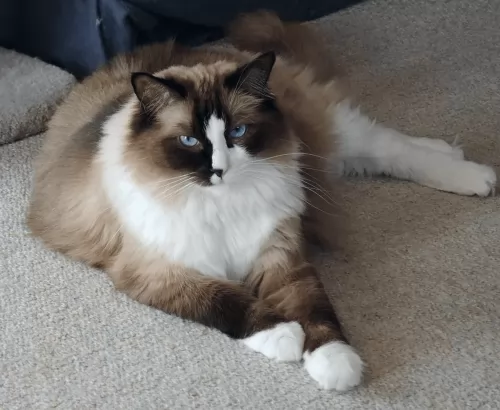 The Ragdoll really is a splendid cat for any family that loves pets. They are such loving cats and adore being pampered by their human owners.
The Ragdoll really is a splendid cat for any family that loves pets. They are such loving cats and adore being pampered by their human owners.
These cats get on well with children and other pets, and because they are such mild-mannered cats, you never find a Ragdoll striking out in anger. That is why it is so important that children be taught kindness and gentleness with animals like the Ragdoll and not to take advantage of its good nature.
Playful and entertaining, the Ragdoll is bursting with his own unique personality – a super feline companion for the whole family.
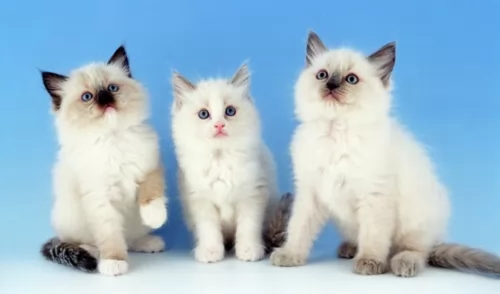 All cats, whatever the breed, can succumb to any one of the many cat diseases there are. A high-quality diet, a loving, caring lifestyle, the appropriate vaccines and parasite treatment can all help to keep your Ragdoll as happy and healthy as possible.
All cats, whatever the breed, can succumb to any one of the many cat diseases there are. A high-quality diet, a loving, caring lifestyle, the appropriate vaccines and parasite treatment can all help to keep your Ragdoll as happy and healthy as possible.
Ragdolls are generally healthy cats but you may want to look out for bladder stones. Another disease to watch for is a heart condition known as hypertrophic cardiomyopathy. This heart disease causes thickening of the heart muscle.
While the disease is usually found in older cats, there is also a juvenile form that affects younger cats, and often young Ragdolls.
Sometimes there aren’t symptoms, and if your cat has labored breathing, loses his appetite or has vomiting, you may need to get your Ragdoll to the vet who will listen to his heart for abnormalities.
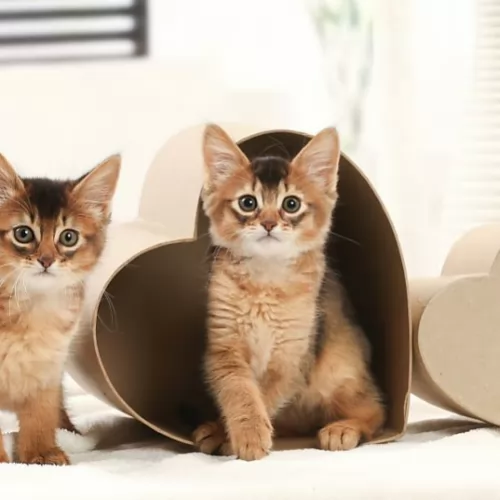 Although the Somali cat breed is healthy, as with many other cat breeds, there are a few hereditary diseases found in the Abyssinian that may be linked to this breed too. Look out for eye problems with the cat as well as anaemia.
Although the Somali cat breed is healthy, as with many other cat breeds, there are a few hereditary diseases found in the Abyssinian that may be linked to this breed too. Look out for eye problems with the cat as well as anaemia.
Progressive retinal atrophy (PRA) is a degenerative disorder of the retina. This eye disease can either be inherited or acquired.
When a cat gets sick there are some antibiotics that have been associated with progressive retinal atrophy in cats. Cats can also develop vision loss if their diet is deficient.
You have to be very aware of your cat’s diet and ensure that he is getting all the right ingredients, one of which is amino acid taurine. If you can see that your cat is battling to see, you should get him immediately to the vet.even though there is no treatment for PRA. . The vet will explain to you how to make life more comfortable for your pet.
Anemia isn’t a specific disease with your cat but rather the result of some other disease or condition. The most common sign that your cat has anemia is that you won’t find that normal pink color of the gums. Your cat will be listless and there may also be signs of blood loss such as blood in the feces or urine. Your vet will do several tests to diagnose the anemia.
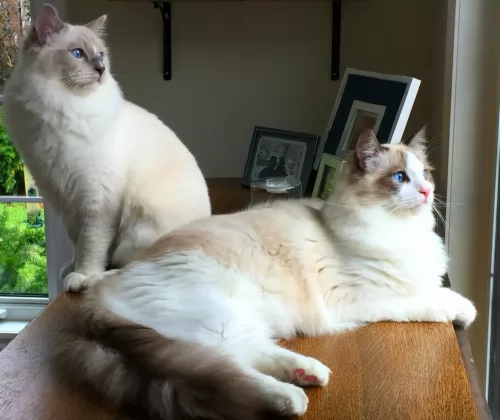 Even though the Ragdoll’s coat is long and silky, it’s the kind of coat that doesn’t require too much maintenance. Certainly, you’ll want to comb and brush it once a week.
Even though the Ragdoll’s coat is long and silky, it’s the kind of coat that doesn’t require too much maintenance. Certainly, you’ll want to comb and brush it once a week.
The other grooming he requires is regular nail trimming.
Understand your Ragdoll’s eating habits. Remember cats are carnivores and this means that their diet has to be made up of meat. Food puzzles are great for these cats but whatever snacks and treats you give your Ragdoll, make sure that they are healthy for a cat and don’t give your cat digestive problems.
Provide your Ragdoll with a litter tray and make sure to remove the feces every single day.
Cats are prone to periodontal disease, but while it has become the latest trend to brush your pet’s teeth, this can be upsetting and traumatic for a pet. A good diet can help to keep teeth healthy. Your vet can look inside your pet's mouth to see if any teeth need attending to.
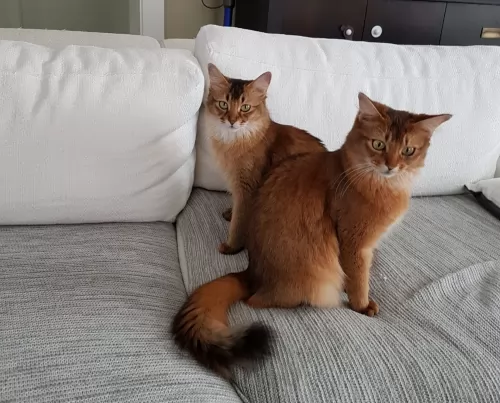 Cats can sometimes be finicky eaters and even the most delectable morsels might be ignored.
Cats can sometimes be finicky eaters and even the most delectable morsels might be ignored.
Every cat is unique but every cat is a carnivore – a meat eater – and requires a host of nutrients in their food to be healthy. Commercial cat foods aren’t all one and the same. You get different food for kittens, different foods for young adults, for pregnant cats, for energetic cats, and so on.
There is cat food for every season of a cat’s life. Other important considerations are feeding the right quantity of food to your cat.